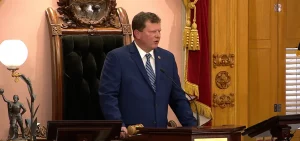News
Upset in Ohio House speaker vote raises questions about legislative priorities
By: Jo Ingles | Statehouse News Bureau
Posted on:
COLUMBUS, Ohio (Statehouse News Bureau) — Going into this first day of the new session, Republican Rep. Derek Merrin (R-Monclova) was thought by many to be the next person to serve as Ohio House Speaker. After all, he was the one Republican caucus members unofficially voted for after the November election.

House Minority Leader Allison Russo (D-Upper Arlington) said while there weren’t any “grand promises” made, Democrats decided to back Stephens. She said, at this point in time, the Democrats are the most consolidated block of votes in the Ohio House, giving them some power in this new, heavily gerrymandered Republican dominated legislature.
And Russo said a key part of the reason the Democrats decided to back Stephens revolved around the recently passed education plan.
“There certainly was a lot of discussion about education funding and the importance of making sure that the fair school funding plan we put in place last general assembly is allowed to take effect and be funded and let it work so I think there was some alignment certainly in that area education and the importance of support for our public schools,” Russo said.
Russo said the Democrats do have power in this legislature and intend to use that “where it is appropriate.”
Merrin was supported by the influential Center for Christian Virtue, a group that has lobbied hard for expansion of school vouchers. After the vote, CCV president Aaron Baer said he was surprised.
“You have 68 [stet] people in this room that were elected to protect religious freedom, protect life, protect families, to promote school choice and so the question is now that they are in leadership, now that they have pulled this, what are they actually going to do? Are they actually going to stand by those words or are they going to flip their positions entirely just so they could have a leadership post. And so, time will tell,” Baer said.
Baer said Merrin won a secret ballot among Republicans in November to replace term-limited speaker Bob Cupp (R-Lima) because the Toledo-area lawmaker has conservative credentials when it comes to religious freedom, family issues and abortion.
“A lot of the people that voted for Jason Stephens say they care about those issues and so we are going to figure out if they really do or if this is just about having positions of power,” Baer said.
Rep. Jay Edwards (R-Nelsonville) was one of the Republicans who backed Stephens in this vote. He said some members, including himself, felt they weren’t being heard by Merrin.
“There hasn’t been as much reaching out since we did that caucus nomination. People have been pretty upset and so that’s what led us to today. It didn’t have to be this way but again, there’s a gentleman’s agreement that everyone would support the person who won in that caucus as long as unity was brought and there wasn’t,” Edwards said. “There was more division that was sowed among the caucus so I think that’s what ultimately led up to today and why we are in this position.”
In his acceptance speech, Stephens said he would work with leaders of all parts of the state to make sure the voters’ concerns are heard.
“I pledge to always have an open door, I pledge to listen and I encourage all to do the same,” Stephens said.
After being elected to the post, the House took a break but Stephens did not immediately talk with the reporters who had gathered. Later, he said he intends “to do my best to try to communicate and to listen and to be there for all members of the House, regardless of party.”
Merrin made no public comments. Other House leaders were elected overwhelmingly, including veteran Republican lawmaker Scott Oelslager (R-North Canton) as speaker pro-tem and Russo as minority leader.
On the Senate side, there wasn’t much of a fight for leadership in the Ohio Senate. Sen. Matt Huffman (R-Lima) was reelected as the Senate President. But history was made in that chamber as Sen. Nickie Antonio (D-Lakewood) became the first openly LGBTQ+ minority leader.

